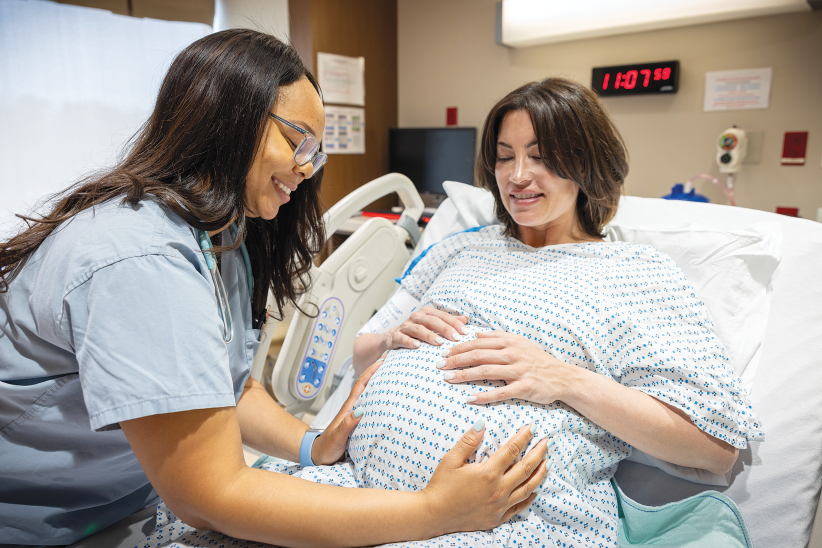As an expecting mother, you are undoubtedly curious about the birthing experience. With so much information at our fingertips in today’s world, it is easy to research all of the different options that are available. At the same time, so many options can make it difficult to figure out what is best. The safest way is to focus on your own questions and wishes and to integrate them in a discussion with your obstetrician or midwife about what is currently considered best practice.
A movement that has gained a lot of attention is the Baby Friendly Hospital Initiative (BFHI). The initiative was created by the World Health Organization (WHO) and the United Nations Children’s Fund (UNICEF) to encourage maternity units to promote informed decision making and evidence-based patient care. BFHI supports the statement issued by the American Academy of Pediatrics’ (AAP) that breastfeeding is a natural and beneficial source of nutrition. There are varying degrees of acceptance by parents and hospital staff, as well as many misconceptions.
At Phelps Memorial Hospital Center, the Baby Friendly maternity unit gives new mothers the education, tools and support that are necessary to help them become successful in fulfilling the nutritional goals they have for their infant. Of course it is important to be sensitive to each parent’s wishes when providing information on infant feeding. Breastfeeding in and of itself is good thing; however, so is a mother’s right to choose what form of nutrition she wants to give her baby.
As expectant parents begin the process of choosing a birthing center, there are several common questions that come up with regard to the Baby Friendly practices:
Q: If I choose a Baby Friendly Hospital, will I be forced to breastfeed?
A: No, choosing to breastfeed is your own decision. The Baby Friendly program is dedicated to begin providing expectant mothers with education and current information early in their pregnancy. This enables parents to make an informed choice, whether it’s to breastfeed or not, and that choice will be respected.
Q: Is it true that Baby Friendly hospitals shut down their nurseries and force babies to stay with their mothers?
A: The goal of BFHI is to promote the American Academy of Pediatrics’ endorsement of “Rooming In,” which recommends that newborns stay in their mother’s room. Rooming in facilitates maternalinfant bonding and aids in the transition to being outside of the womb, while giving new parents an opportunity to learn how to care for their baby. Rooming in is recommended for all families, breastfeeding or not. There is a newborn observation area if parents request to be separated. For special circumstances, there is a procedure room and special care nursery if indicated.
Q: Do hospitals choose to become Baby Friendly because it saves them money?
A: It is actually quite the contrary. Becoming a Baby Friendly Hospital costs more, because additional staff and equipment are often needed to accommodate Rooming In. Also, Baby Friendly hospitals no longer accept free formula and supplies from formula companies because they are considered marketing strategies that violate the WHO’s International Code of Marketing of Breast-Milk Substitutes. Therefore, the hospital must pay for its supply of formula.
Q: Is the reason that nurses want their hospital to become Baby Friendly because it means less work for them?
A: Absolutely not. The nurses on a Baby Friendly Unit must complete an educational process that consists of clinical and infant feeding courses to ensure they are proficient in providing care to both breastfeeding and formula-feeding mothers. The nurses have responsibility for both mother and baby, which is beneficial because it fosters smoother continuity of care. Postpartum women need care for themselves as well as their newborns, and it helps tremendously to have knowledgeable nurses who are available 24 hours a day.
Q: If I want to formula-feed my baby and/or supplement breastfeeding with formula, can a Baby Friendly Hospital provide the formula?
A: Yes, the hospital has formula and will supply it if that is your choice and/or it is medically indicated. The objective is to provide the education you need to help make the best decision for you and your baby. Sometimes, when mothers who choose to breastfeed have difficulty, they worry that their baby is not getting enough milk and decide to ask for formula. In such cases, our nurses and lactation consultants provide nursing care to help the mothers overcome their difficulties, avoid unnecessary supplementation, and ensure their baby gets appropriate nutrition.
Kara Giustino, RN, MSN, CPNP, is the Clinical Educator Maternal Child Health and Yeva Posner, RN, BSN, IBCLC, Lactation Coordinator, Phelps Memorial Hospital Center. If you have any questions or would like additional information regarding the Baby Friendly Hospital Initiative at Phelps Memorial Hospital call 366-3359. phelpshospital.org.













